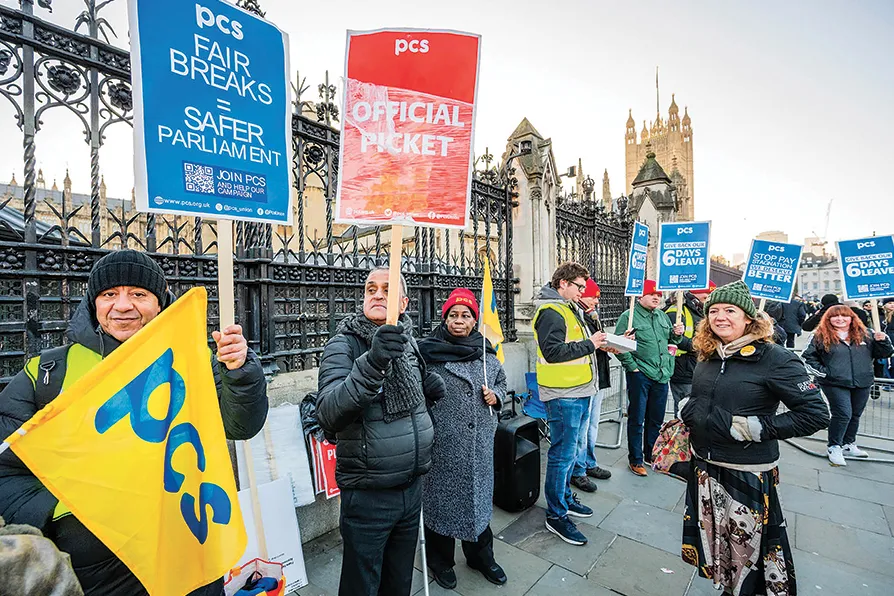Marco Rubio views 1945 as a defeat for the West, wants to revise the post-war order, while German ministers lead the standing ovation. SEVIM DAGDELEN reports
FRAN HEATHCOTE believes that while the the Chancellor outlined some positive steps, the government does not appreciate the scale of the cost-of-living crisis affecting working-class people, whose lives are blighted by endemic low pay

 LAST RESORT: PCS picket at the House of Commons (Fran Heathcote on the right wearing a green beany) / Pic: Author supplied
LAST RESORT: PCS picket at the House of Commons (Fran Heathcote on the right wearing a green beany) / Pic: Author supplied
IN THE last couple of days, I’ve stood on picket lines with PCS members on strike for better pay and working conditions.
On Budget day, our members working as security guards at the House of Commons were on strike in their ongoing dispute over stagnating pay and cuts to annual leave. They voted 99 per cent in favour of strike action.
The next day I joined our members at the Tate Gallery, who have been offered a 2 per cent pay rise. They voted 98 per cent in favour of strike action. The day before, the Office for Budget Responsibility forecast that inflation will average 3.5 per cent this year.
In her Budget speech, Chancellor Rachel Reeves told the House of Commons: “I said that there would be no return to austerity, and I meant it.”
Perhaps she could visit our picket lines and tell our members why they are being offered cuts in their living standards, then? Maybe management in Parliament and at the Tate didn’t get her memo?
In January 2026, we will begin balloting our members in the Department for Work and Pensions (DWP). In the lowest grades, these members too have been offered a pay rise that does not meet the cost of living. In some cases their pay is so low that it will have to go up in April when the national living wage increases.
In a consultative ballot last month, DWP members voted 80.5 per cent in favour of industrial action. Management have refused to reopen talks, so our members have no alternative.
Alongside the ballot, we surveyed our members about the impact low pay is having on them. One told us: “It makes me not want to continue working for the DWP. It’s a professional and high-level job but you get paid peanuts.”
The impact of low pay has also affected our members’ mental health, with many telling us that not being able to afford to see friends and family or have a holiday, was affecting their mental state.
These are the government’s own employees, administering the benefits system, yet more than one in 10 DWP members has to claim universal credit in order to top up their low wages. The government is subsidising its own low pay.
There was no mention of public-sector pay in the Chancellor’s more than hour-long Budget speech or in the Budget documents published afterwards. Across the Civil Service and right across the public sector, pay has been driven down by years of pay freezes and pay caps.
TUC policy, unanimously passed at Congress 2024, is for “pay restoration” so that workers’ living standards are restored. Yet in some cases, and even for the lowest paid, pay is still being driven down.
The Budget did do some good things, though. Most importantly it scrapped the two-child limit, which has been the primary driver of rising child poverty in recent years. That move will benefit 1.6 million children, and left nearly half a million out of poverty.
PCS has campaigned against this policy from the start, and we pay tribute to the seven MPs who were suspended from the Labour whip for voting to scrap it a year ago – Apsana Begum, Richard Burgon, Ian Byrne, Imran Hussain, Rebecca Long-Bailey, John McDonnell and Zarah Sultana. They are owed an apology.
It is also welcome that Labour has frozen rail fares next year. We currently pay the highest rail fares in Europe, and freezing regulated fares will deliver a saving for workers who commute to work.
Energy bills have increased by around 70 per cent in the last five years, so it is welcome that the Chancellor announced a £150 reduction in energy bills from April 2026. That won’t help those struggling this winter, but it does provide a light at the end of the tunnel.
Despite the rising cost of rents and mortgages in recent years, there was nothing to tackle housing costs. Some city region mayors have been calling for powers to control rents, so it is disappointing that their calls went unheeded.
Despite British banks recording record profits in the last three years, there was no action taken to drive down mortgage costs, and no windfall tax on these profiteers.
At last year’s Budget, the Chancellor said that extending the freeze on income tax thresholds would hurt working people — and she would not do it. Now Reeves has extended the income tax threshold freeze for an extra three years, until 2030-31.
The Resolution Foundation says income tax threshold freeze extension means basic rate taxpayers pay £140 more in 2029-30.
When thousands of the government’s own workforce are balloting for strike action over poverty pay, what is the Chancellor thinking in taking more from people already struggling to make ends meet.
While this Budget contained some positive steps, it is clear that this government does not appreciate the scale of the cost-of-living crisis impacting working class people.
Fran Heathcote is general secretary of the Public and Commercial Services Union (PCS).









